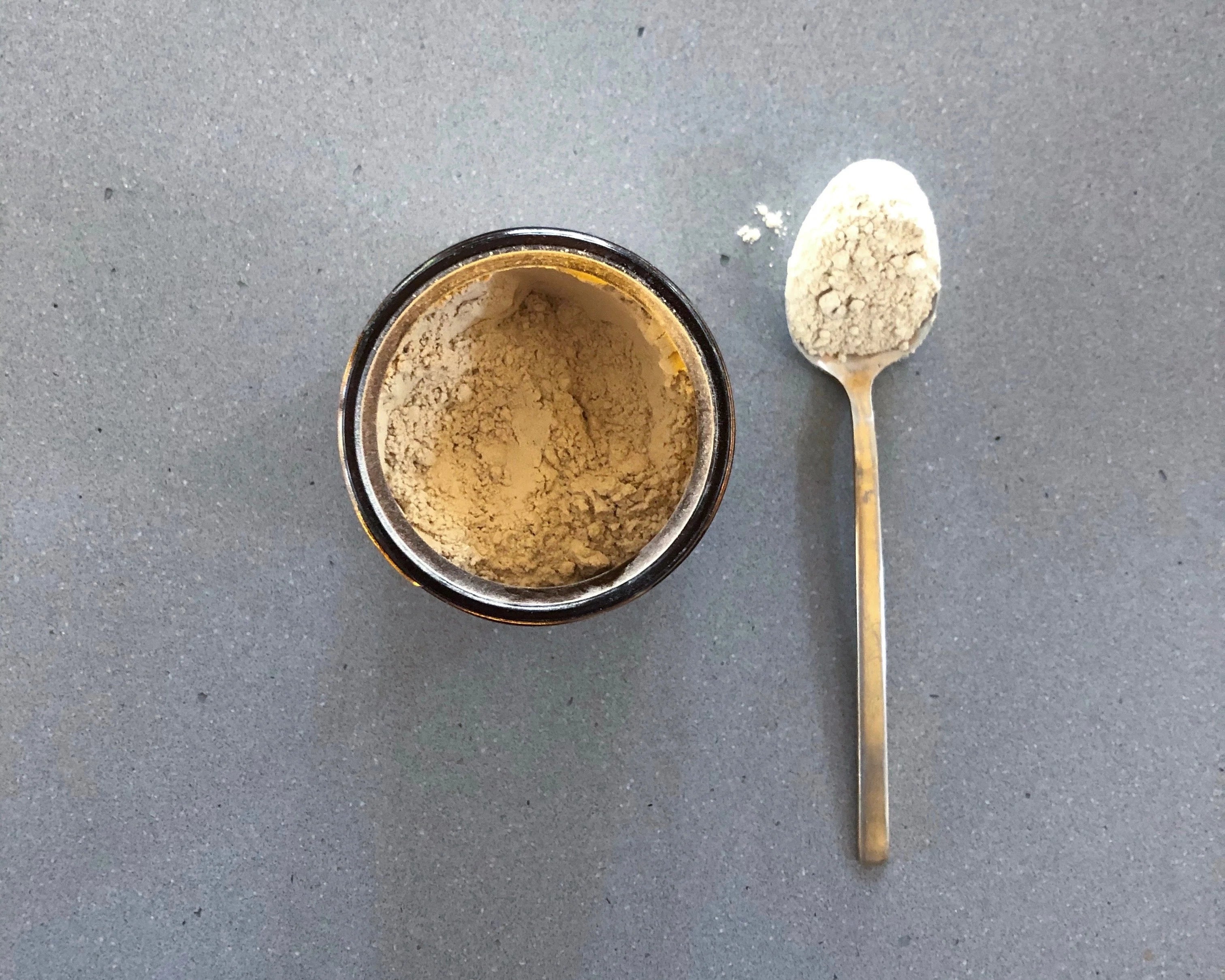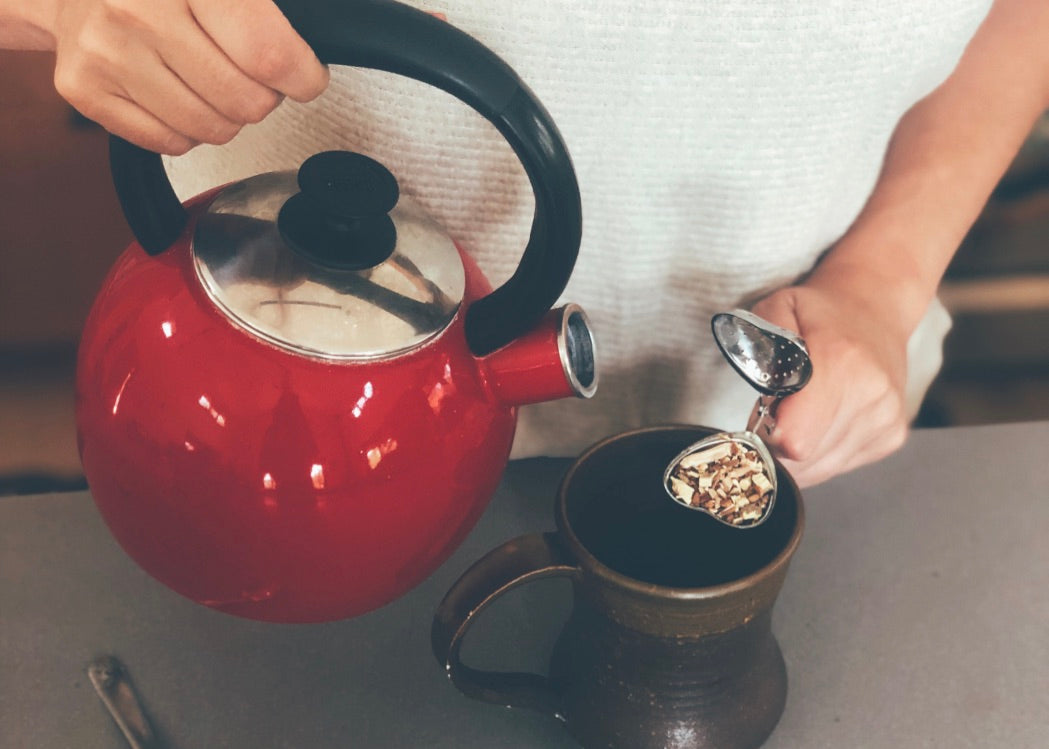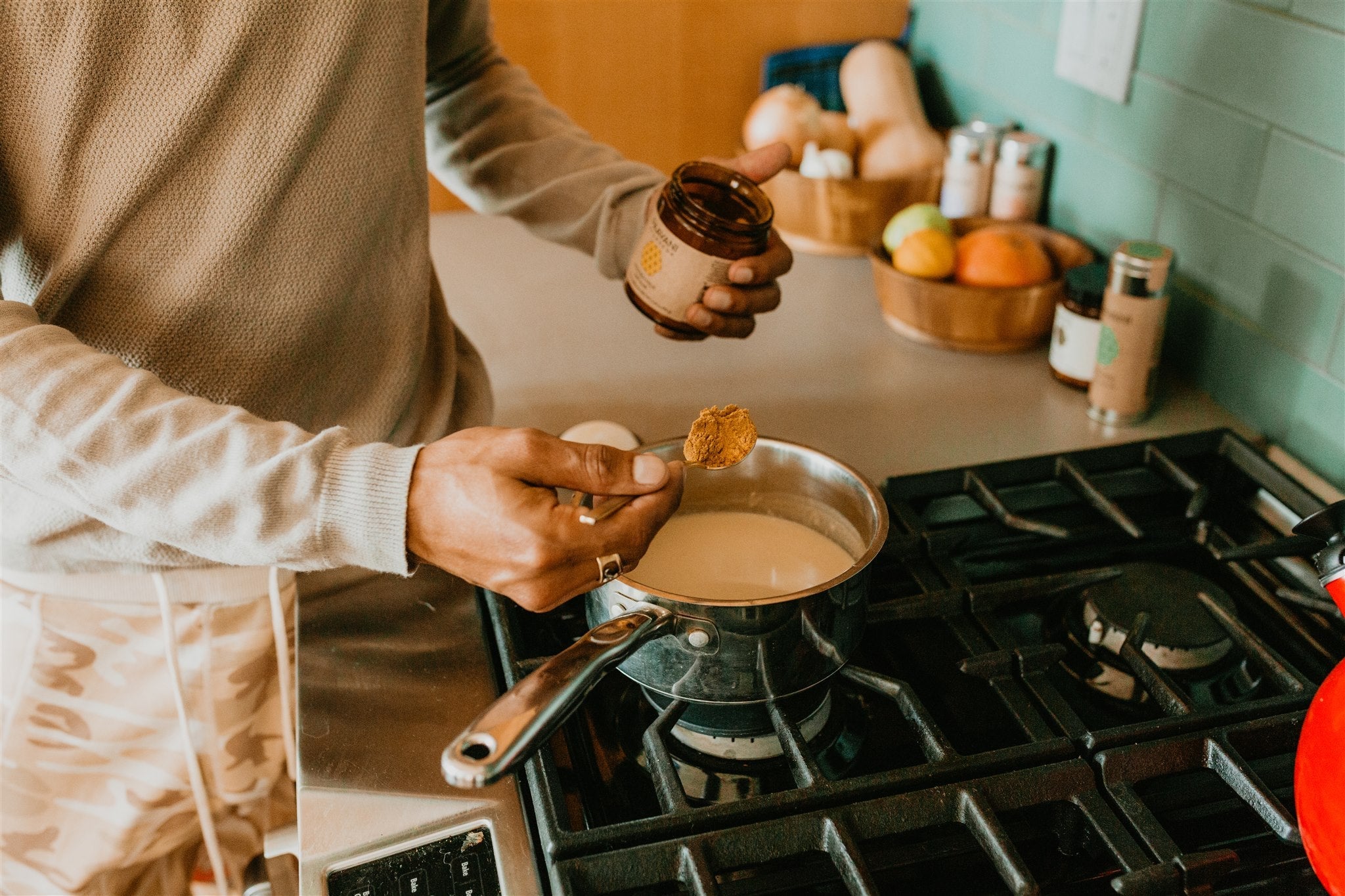
The Many Benefits of Ashwagandha, the King of Ayurvedic Herbs
Ashwagandha was one of the first herbs we were instantly drawn to when beginning our journey into Ayurvedic herbalism, so we are thrilled to announce that we are now offering ashwagandha in our Teas, Tonics & Elixirs Collection! There are so many health benefits of this sacred plant but let’s begin with some basics.
The botanical name of the ashwagandha plant is Withania somnifera, also known as Indian ginseng or winter cherry. Its medicinal part is found within its strong and vital root system. Although native to India and North Africa, we have personally found that ashwagandha grows well where we live in Grass Valley, CA thanks to the hot and dry climate.

Ashwagandha is a highly revered herb in the Ayurvedic apothecary and is considered the ‘King of Ayurvedic Herbs’. It has been supporting the human body and mind for over 3,000 years. The name ‘ashwagandha’ literally translates to ‘the smell of the horse’ which refers to its unique smell and ability to increase strength and vigor. It has an affinity for supporting vata dosha and just may be the perfect herbal ally for the upcoming winter months. In case you are wondering, although deemed ‘the smell of the horse’ we have not found the smell or taste of ashwagandha to be off-putting in any way!
Let’s take a look at some of the ayurvedic benefits of ashwagandha:
Ashwagandha For Stress Relief & Sustained Energy
Ashwagandha is an adaptogen, meaning that it supports the body’s ability to withstand stress and anxiety. In Ayurveda, the Sanskrit term for adaptogen is rasayana. Rasayanas help replenish the tissues of the body and are recommended when one is feeling weak, debilitated, or low in ojas (strength and vigor). Rasayanas, like ashwagandha, also calm the nervous system and ease feelings of anxiousness and overwhelm which can occur when one is feeling an increase in vata dosha. Ashwagandha helps balance cortisol, the steroid hormone which can increase to an unhealthy level whenever we become stressed or anxious. Lastly, this powerful herb has the ability to strengthen the muscles, marrow and semen; thus, it is often recommended for males who need a boost in libido and/or overall reproductive system support.
Ashwagandha For Healthy Skin
Have you ever heard the old saying that stress causes wrinkles? Well, it is actually true! Our adrenal glands produce hormones called catecholamines during times of physical or emotional stress. Catecholamines increase production of oxidant molecules which can lead to cellular breakdown. This is the first step in the aging process. Thankfully, ashwagandha is a nervine tonic that helps the body to withstand stress and is a stabilizing force for the central nervous system. This is great news for the health and vitality of your skin!
Equally important for maintaining beautifully healthy, radiant skin is ashwagandha’s ability to stimulate DHEA, or dehydroepiandrosterone, another hormone produced by the adrenal glands, which is a precursor to testosterone and estrogen. DHEA is an important hormone to keep balanced in order to ensure healthy production of the skin’s sebum, or natural protective skin oils. Finally, ashwagandha promotes the production of vital compounds and proteins for healthy skin such as hyaluronan for skin hydration, elastin to keep the skin supple and collagen for skin strength. In short, ashwagandha is an excellent Ayurvedic skincare anecdote for dry or aging skin. It is also ideal for the cold, dry months of fall and winter, which have the potential to wreak havoc on otherwise balanced skin.
Ashwagandha’s Anti-inflammatory & Antioxidant Properties
Many of ashwagandha’s profound health benefits are due to its high concentration of withanolides, which have been shown to combat inflammation & tumor growth. This potent plant has even been shown to fight cancerous cells and impede the growth of new cancer cells.
Ashwagandha is also packed with antioxidants that allow it to successfully fight free-radical damage caused by the sun. According to Healthline, in one study of ashwagandha, men that took the herb experienced increased antioxidant levels in their blood. This study is an example of western, allopathic medicine scientifically proving what the ancient rishis and Ayurvedic doctors have known for over 3,000 years, that ashwagandha (like so many other medicinal plants) contains the intuitive wisdom to heal and strengthen our physical and emotional bodies.
How to Take Ashwagandha
Traditional Methods
Traditionally, Ayurveda recommends mixing a ½ teaspoon of our powerful ashwagandha powder in a ½ cup of tepid water in the AM & PM, at least 1-2 hours away from meals, as a mind and body tonic. This method of mixing powdered herbs with water is called an Ayurvedic churna. It is an excellent way to connect your senses with the plant medicine and evoke the earth element.
Another traditional method of intaking ashwagandha is to make an Ayurvedic Evening Elixir by combining a ½ teaspoon of ashwagandha powder, ½ teaspoon of ghee and a dash of nutmeg or cardamom with a ½ cup of warm milk. This will bring stability to the mind and prepare the body for a restful night’s sleep.
Other Methods
Ashwagandha is being incorporated into people's food rituals by way of mixing the powder into smoothies, coffee, baking and cooking. Although this is not the traditional method of intaking ashwagandha, we are in support of this trend and have even included ashwagandha powder as one of the ingredients in our healing Ayurvedic Golden Milk recipe.
As a company, we believe that it is important to meet people where they are at on their self-care journey. Thus, we are in full support of adding ashwagandha to meals, smoothies and drinks in order to obtain the healing and medicinal properties of the herb. And yes, we do add ashwagandha to our own drinks and meals! We find it to be a great conversation starter when cooking with friends and family. Cooking with ashwagandha is an effective way to introduce plant medicine into other people’s lives and that makes us in full support of this trend!
When Would I Not Want to Take Ashwagandha?
In general, ashwagandha is contraindicated if one is experiencing excess ama or toxins in the body and/or an imbalance in kapha dosha. Both of these conditions require detoxification rather than rejuvenation. For example, if one is feeling heavy, unmotivated and/or sluggish, it would not be helpful to wrap this person in a warm, heavy, comfortable blanket in order to motivate the person to get up and get moving. Ashwagandha acts a lot like that warm, heavy blanket and we do not recommend ashwagandha be taken when there is high ama or a kapha imbalance. If you already feel grounded, steady and strong in the body and mind, ashwagandha can certainly be used to maintain health and wellness; however, if you begin to feel heavy and/or overheated, we suggest reducing the amount of ashwagandha you are consuming to ensure you do not vitiate kapha dosha.
Ancient Ayurvedic Plant Wisdom for the Modern World
Ashwagandha is a time tested plant with immense wisdom and healing energy to share with humankind. With over 3,000 years of medicinal use, modern science is just beginning to unearth the healing properties and full potential of this sacred root. From glowing skin to healthy cells and a stabilized nervous system, ashwagandha’s applications are abundant and this plant truly evokes beauty from the inside out. We hope you enjoy implementing ashwagandha, the ‘King of Ayurvedic Herbs’, into your daily self-care ritual and would love to hear about your experience in the comments section below.





6 comments
@Sofija Ashwagandha may help boost libido and fertility; therefore, taking Ashwagandha while trying to get pregnant can be helpful. If pregnant or breastfeeding, we recommend people speak with their healthcare provider to determine if Ashwagandha in small doses can be beneficial for them. Also, more evidence based research in the future will help identify the benefits and/or contraindications of taking Ashwagandha while breastfeeding or pregnant. Lastly, we recommend meeting with our Clinical Ayurvedic Specialist, Laurel Odom, who can help tailor a custom Ayurvedic pregnancy and postpartum plan based on your constitution.
Here is some more information on Ashwagandha, pregnancy and breastfeeding: https://www.freshlymoms.com/blogs/news/ashwagandha-during-pregnancy.
PAAVANI Ayurveda
@MohdFaizHusain Ashwagandha is considered warming in nature. Depending on your current state of the doshas, you can incorporate Ashwagandha regularly into your herbal supplement routine. If you would like to learn more about how Ashwagandha can benefit you personally, we recommend scheduling a consultation with our Clinical Ayurvedic Specialist. She is available for virtual visits!
PAAVANI Ayurveda
Hello!
I keep reading ashvagandha is not safe for pregnancy and breastfeeding, yet it is suggested to use for hormonal imbalances for women. I personally have them so I started using it, but I’m also not avoiding getting pregnant.
What would be the best solution here? Why is it not considered safe?
Sofija
Is Aswagandha is hot or cold in nature? And i also want to know can i take it with regular basis if my age is 22
Mohd Faiz Husain
Hi Lisa,
Thank you for asking us to clarify a bit further about when one would not want to take ashwagandha. From the Ayurvedic perspective, if one is feeling grounded, stable and strong in the body and mind, ashwagandha can certainly be used; however, one would want to monitor how he or she feels if taking a teaspoon of ashwagandha per day regularly for overall health and wellness. If one begins to experience an imbalance in kapha dosha (heaviness, lethargy, congestion, lack of motivation) or high ama, then ashwagandha should be omitted as a daily supplement and generally speaking, the focus should be on detoxification instead of replenishment. Since you are in the vata stage of life and also a vegan, I do think ashwagandha could be an excellent daily supplement to support you body and mind. If you do notice any tell tale signs of kapha imbalance after a couple of weeks of taking ashwagandha daily, we suggest to limit your ashwagandha intake to 1/2 teaspoon per day and see how you feel. Also, you can use ashwagandha powder topically for skincare if you decide taking it daily increases kapha in a counterproductive way. I hope this clarifies things a bit better. In short, ashwagandha is an amazing, replenishing herb and strong, grounded folks can certainly enjoy it but we encourage people to stay aware that if they experience a kapha imbalance or increase in ama, it could be beneficial to omit an adaptogenic herb like ashwagandha for a period of time.
PAAVANI Ayurveda
I am confused…You say to incorporate Ashwagandha into a daily health care ritual, BUT if I am already feeling good, etc but want the benefits for healthy skin and muscle strength then you mention it would be contraindicated taking it if already feeling strong and grounded.
Please explain why a healthy strong 62 yr old vegan woman would not benefit from a teaspoon a day.
thank you!
Lisa Ames
Lisa
Leave a comment
This site is protected by hCaptcha and the hCaptcha Privacy Policy and Terms of Service apply.